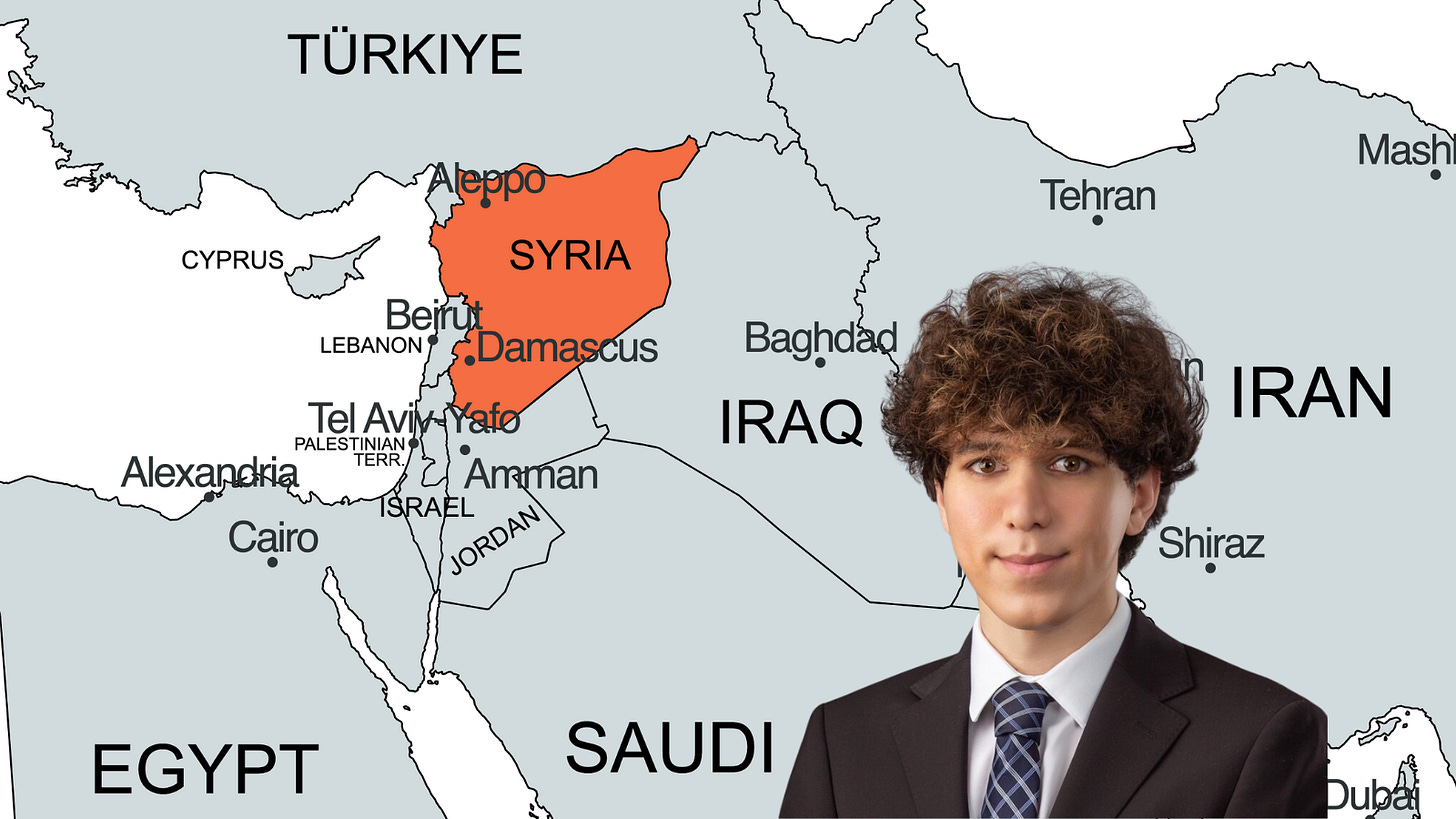🇸🇾 Syria’s next chapter: A Syrian-American on what Assad’s fall means for the future
Syrian-American foreign policy analyst Kareem Rifai explains why Assad’s ouster is both a turning point and a delicate crossroads for Syria.
It finally happened. Bashar al-Assad, Syria’s infamous dictator, is out. After half a century of the Assad family ruling Syria with an iron grip—first Hafez, then his son Bashar—the latter has now slinked off to Russia seeking political asylum. For Syrians worldwide, this moment marks the end of an era defined by brutal repression, civil war, and the world’s worst refugee crisis since World War II.
For many, it’s a cause for celebration—and some much-needed hope. But Assad’s downfall also raises pressing questions: What comes next? Can Syria rebuild, or will this just be a reshuffling of power among bad actors?
Kareem Rifai, a Syrian-American political and foreign policy analyst, sees these questions as deeply personal and politically urgent. Speaking to Zivvy News, he explains why Assad’s ouster is both a turning point and a delicate crossroads for Syria
A Long Time Coming
Assad’s reign, shaky since the 2011 Arab Spring protests, ended with a crescendo of rebellion and resistance. Inspired by uprisings in Tunisia, Libya, and Egypt, Syrians demanded freedom, only to be met with brutal crackdowns. What started as protests spiraled into a full-blown civil war. Millions fled. Entire cities were destroyed.
The final blow came not from international intervention but from rebel forces like Hay’at Tahrir al-Sham (HTS), a group that’s, well, complicated. HTS started as an al-Qaeda affiliate but has since tried to rebrand itself as a more palatable, Syria-first organization. It’s their interim government now steering the ship—at least for the moment.
Many world leaders are concerned about a “power vacuum” that could allow groups like ISIS to make a comeback. But Rifai argues that Syria isn’t Iraq, Libya, or Afghanistan and comparisons to to other post-conflict states miss the mark. The dynamics on the ground are unique, he says, and so is the potential for change.
“When there's so many parties on the ground in Syria, of course you're gonna be worried about who the next rulers are going to be and how they're going to treat the people,” Rifai said. “However, I find the comparisons to Iraq, to Libya, to Afghanistan, really not representative of the situation on the ground in Syria at the moment.”
Skepticism is healthy, but Rifai believes Syria has something those other countries didn’t: a globally connected diaspora. Millions of Syrians have lived abroad and witnessed how other nations have stumbled—and occasionally succeeded—through transitions of power.
“This doesn't mean that HTS is going to do free and fair elections tomorrow with a secular pluralist government, et cetera” Rifai explains. “Lessons have been learned, Inshallah [God willing]. So that's the hope that Syrians have, as well as the fact that Syrians in the diaspora and Syrians on the ground are actively pressuring HTS to ensure that these mistakes don't happen.”
The Role of the Diaspora
Diaspora Syrians are already flexing their influence. When HTS’s interim leader, Mohammed al-Bashir, appeared in a cabinet with an Islamic flag and the Free Syrian flag in the background, the backlash was swift. Syrians abroad called him out, and he quickly pivoted, appearing on Al-Jazeera with just the Free Syrian flag.
It’s a small example, Rifai says, but it shows how connected Syrians everywhere are to the country’s future.
And the international community is paying attention. U.S. Secretary of State Antony Blinken has pledged support for a new Syrian government. But support alone isn’t enough, Rifai warns.
Navigating Syria’s fragmented political landscape while the Israel-Hamas war and tensions in Lebanon complicate the region further.
“Just because the war in Syria is over doesn't mean that the international community should withdraw from the Syria issue,” Rifai adds. “There's a million other things that need to be resolved before we can say definitively that the war is over. We need to have a democracy. We need to have elections, free and fair elections, and all Syrians need to have a seat at the table.”
This moment is deeply personal for many Syrians, including Rifai. His mother, Shadia Martini, knows this better than most. A survivor of Assad’s brutal crackdowns, she took the bold step of running for public office in Michigan—a state far removed from Syria’s turmoil but not its echoes.
Rifai says that many Syrians in the West stay silent still because they've been conditioned from a young age with the popular Arabic, ‘the walls have ears.’
“You cannot speak about politics because it could land you or your parents or your family in prison,” he says. For his mother, “it was a huge step not only to speak out, but also to run for public office. Because if you're not a Ba'athist in Syria or a Ba'athist ally, there's no way that you could ever run for public office and speak freely.”
What’s Next?
Syria’s road ahead is messy, uncertain, and fraught with risks. But Rifai sees a glimmer of possibility.
The fall of Assad isn’t the end of Syria’s story—it’s the beginning of a new chapter. And while the world debates geopolitics, Syrians everywhere aren’t wasting this moment. They are quietly, determinedly writing their own futures.
For Rifai, this isn’t just about a regime change,” he says. “It’s about reclaiming a country that’s been defined by dictators, warlords, and suffering for far too long.”
Dig Deeper:
↳After toppling Assad, can Syria’s rebels rebuild a shattered state? (Washington Post)
↳Bashar al-Assad’s regime has fallen in Syria. How will this change the Middle East? (The Conversation)



